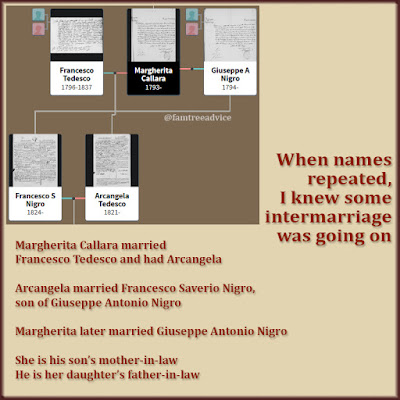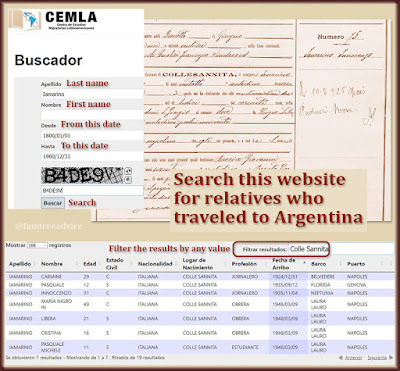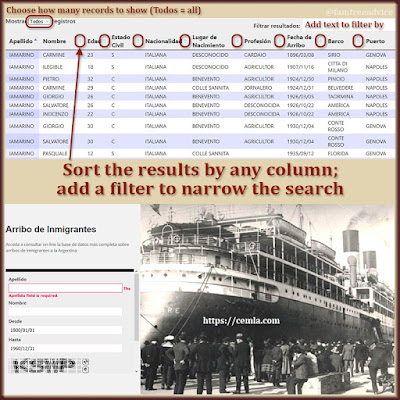Your reasons for dabbling in genealogy can change over time.
My family tree has almost 24,000 people. You may think I'm swallowing up other people's family trees. Nope. Never ever would I do that.
Two years ago I wrote about how and when to cut a branch off your family tree. I cut my sister-in-law's entire family out of my tree because:
- I didn't intend to work on them anymore.
- People kept asking me about them—and they're not mine.
- I had a new focus for my family tree.
Trimming that big branch off my family tree let me sharpen my genealogy focus.
 |
| Having a clear reason for doing genealogy makes it more rewarding. |
You see, all my ancestors came from a 10-mile radius in Italy. They came from small towns with windy roads leading in and out. I soon found that the families intermarried. Almost everyone in these little towns had a connection to me.
I discovered this by reading the vital records from my grandfather's hometown. (They ranged from 1809 to 1860). When I began my research, I knew almost nothing about his family. His parents were Giovanni Leone and Mariangela Iammucci, and he had a brother Noah and a sister Eve. (That's pretty funny since his name was Adam.)
The only way to tell which Leone and Iammucci families were mine was to document everyone. In the end, I identified some of my grandfather's 4th great grandparents. And I had added 10,000 people to my family tree.
I spent 5 years researching the town (2007–2012). The whole time, I was thinking, "I can't wait to do my other grandfather's town!"
Fast-forward to 2017. The vital records I documented by viewing terrible-quality microfilm were online. Their quality was fantastic. And the documents went way beyond the 1860 limit of the microfilm I saw. My other ancestral towns were available, too. It's all free and downloadable. (See "How to Use the Online Italian Genealogy Archives.")
The availability of these records sharpened my focus. My mission is to document all the connections among the people in my ancestral hometowns. My paternal grandparents were 3rd cousins. Now I have the vital records to back up that fact. My parents share DNA. Right now I'm exploring every branch of a DNA match's family tree because she matches both my parents. Each of her parents is my 6th cousin. Most of them come from my Iamarino hometown—my dad's side. Can I find a marriage in her family tree that draws in someone from my mom's ancestral hometowns? That's the goal.
Much like the little tree my husband pruned 2 years ago, my family tree is thriving. Cutting out the excess and putting energy into my priorities is key.
 |
| Trimming my family tree sharpened my focus and my goals. |
Here are some focus-finding ideas to consider.
Goals Can Drive Your Research
Do you have specific goals for your genealogy research? One of my goals is to learn the names of all the families from my ancestral hometowns. These towns are my heart and soul. Learning their names, and finding their life events, gives me a joy I can't describe.
You Have More Cousins Than You Know
Are you interested in finding your ancestors' descendants? My 2nd great grandfather, Antonio Saviano, was my first ancestor to come to America. He had 4 children who lived to adulthood. Those 4 children had 21 children who lived to adulthood. That makes a ton of cousins, many of whom I've never met.
Imagine tracing the descendants of your 3rd or 4th great grandparents. Where will their descendants lead you?
DNA Unlocks Unknown Relationships
Do you want to figure out your relationship to your DNA matches? I've gotten in touch with cousins I never knew—or whose names I knew but I'd never met.
You need to make your tree as wide as possible to find the connection. Don't add your great grandparents to your tree and move on. Find their siblings. Who did they marry? What were the names of their children? Those families will tie you to your DNA matches.
I mentioned that both my DNA match's parents are my 6th cousins. That means we share 5th great grandparents. I needed to work all the 5th great aunts and uncles into my family tree. A wider tree will give you far more connections.
If you focus on your reasons for building your family tree, that focus will guide your process.
My focus is to connect everyone I can by using available Italian vital records. When it comes to my family in America, I have an in-law rule to keep me on track. Let's say my second cousin's husband is in my family tree. I'm not going to document him (the in-law) beyond his birth and marriage dates and the names of his parents. I'm not putting his siblings or his grandparents in my tree—even if I know their names. Unless my cousin asks me to research their spouse, they get cut off at their parents.
That's why I cut out my sister-in-law's 600-person branch. (I made them a separate tree.) It's why I removed the siblings and grandparents from more distant cousins' spouses. Focus.
Genealogy is a never-ending puzzle. An interesting, entertaining, educational hobby. Find your focus—your purpose—and you'll have a stronger family tree.











